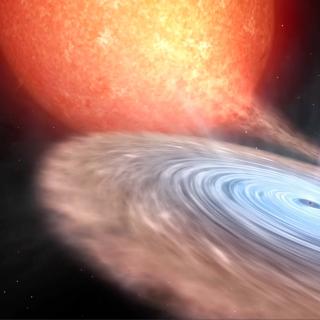Bibcode
Allen, J. L.; Linares, M.; Homan, J.; Chakrabarty, D.
Referencia bibliográfica
The Astrophysical Journal, Volume 801, Issue 1, article id. 10, 13 pp. (2015).
Fecha de publicación:
3
2015
Revista
Número de citas
18
Número de citas referidas
16
Descripción
Tracking the spectral evolution of transiently accreting neutron stars
between outburst and quiescence probes relatively poorly understood
accretion regimes. Such studies are challenging because they require
frequent monitoring of sources with luminosities below the thresholds of
current all-sky X-ray monitors. We present the analysis of over 30
observations of the neutron star low-mass X-ray binary SAX J1750.8-2900
taken across four years with the X-ray telescope aboard Swift. We find
spectral softening with decreasing luminosity both on long (∼1 yr)
and short (∼days to week) timescales. As the luminosity decreases
from 4 × 1036 erg s‑1 to ∼
1× {{10}35} erg s‑1 (0.5–10
keV), the power law photon index increases from 1.4 to 2.9. Although not
statistically required, our spectral fits allow an additional soft
component that displays a decreasing temperature as the luminosity
decreases from 4 × 1036 to 6 × 1034
erg s‑1. Spectral softening exhibited by SAX
J1750.8-2900 is consistent both with accretion emission whose spectral
shape steepens with decreasing luminosity and also with being dominated
by a changing soft component, possibly associated with accretion onto
the neutron star surface, as the luminosity declines.
Proyectos relacionados

Agujeros negros, estrellas de neutrones, enanas blancas y su entorno local
Los agujeros negros y estrellas de neutrones en binarias de rayos-X son laboratorios únicos para explorar la física de estos objetos compactos. No solo permiten confirmar la existencia de agujeros negros de origen estelar a través de mediciones dinámicas de sus masas, sino que también permiten investigar el comportamiento de la materia y la
Montserrat
Armas Padilla